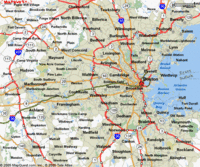What I think that Travis misses in his essay is the fact that monopoly power is real. That the government (state and federal) currently has a monopoly over the highway system is not really a good argument for replacing one monopoly with another. The only good reason to privatize highways is to increase the efficiency of our highway system through incentives and competition. Clearly the public would not be well served if a single firm controlled all of the highway routes between two places. If this were the case that firm would price tolls higher and invest less than if a competitor operated an alternate route and each driver had a choice of with route to take.
My point is not that a private highway network is unworkable, but only that the government
 should have regulatory authority to ensure that no firm gains monopoly power over consumers. For example separate firms should operate interstates 95, 495, 93, and route 90 in the Boston area to ensure that drivers had multiple options to reach their destination.
should have regulatory authority to ensure that no firm gains monopoly power over consumers. For example separate firms should operate interstates 95, 495, 93, and route 90 in the Boston area to ensure that drivers had multiple options to reach their destination.In addition other modes of transportation such as railroads and air travel should be included in the definition of travel when assessing a firm’s market position. The CEO of Amtrak has stated that he believes that transporting people is only a marginally profitable business. How can this possibly be true? Americans travel constantly for business and pleasure and are willing to pay for that ability. The reason that the major airlines lose millions of dollars a day and that Amtrak needs over a billion dollars a year in government subsidies is that the transportation industry has been constrained and regulated too much by government. Freeing all modes of transportation from government control and only regulating enough to prevent monopoly power (which likely means not at all in many if not all markets) will enable private capital to improve our national transportation network and earn strong returns while they do.

No comments:
Post a Comment